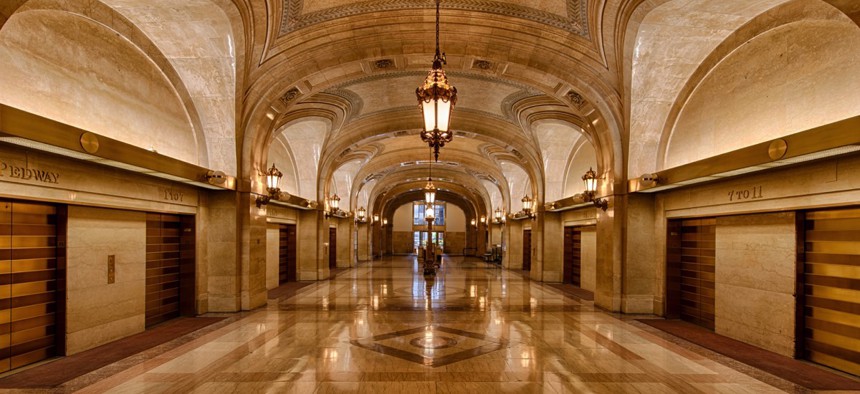Can Hands-On Civics Heal Chicago?

Chicago, Illinois City Hall. Through Envision Chicago, students learn civics lessons by engaging with city laws.

Connecting state and local government leaders
Students gain more than just an understanding of civics when they dive into the laws of their city.
You do not need a pollster or pundit to tell you that America’s political system is fracturing and failing. Almost everywhere you look, anger, violence and fear are trumping optimism, cooperation and courage. And we cannot fault this embarrassing election cycle or current crop of candidates. Trouble has been brewing for years.
The accumulated impact of today’s civic crisis should disturb everyone of all political persuasions. It already does— a paltry 19 percent of Americans say that they can trust the government always or most of the time, according to the Pew Research Center.
The leaders of tomorrow are watching closely. The politics of distrust, disengagement and despair are fast becoming the only politics they know. Worse, many young people have neither experienced actual good governance nor received, in school or at home, even the most basic civic education.
According to the 2014 National Assessment of Educational Progress, a mere 23 percent of eighth grade students have a proficient knowledge of civics. That means nearly eight out of ten of our future presidents, congressmen and judges do not understand what those offices are, do, or mean in the United States. The consequences should be clear, but who is to blame? Not the students.
“Government isn’t handed down in the genes,” said former Supreme Court Justice Sandra Day O’Connor in a recent interview on her work using technology to bring civics back into the classroom. “It has to be taught through every generation.”
We couldn’t agree more. And like Justice O’Connor, we are doing something about it. Enter Envision Chicago, a new initiative geared at turning back this toxic tide and teaching productive civic engagement by helping students engage productively with their city government. The people behind Envision Chicago— City Clerk Susana Mendoza, our team at The OpenGov Foundation, four aldermen, four local high schools and a bevy of community groups— have come together to take a stand for civil discourse, for civic literacy and for using modern technology to build better government in full partnership with our future leaders.
Here’s how Envision Chicago works: since March 17, students at the four participating high schools have been diving into the laws of their city, using ChicagoCode.org to find issues important to them, their families and neighborhoods. Using the first open, accessible and user-friendly online edition of the Chicago Municipal Code and a simple web form, they are proposing to the city council improvements to the law in order to make Chicago a better place to live. Their elected officials will then consider each proposal, picking a winning idea from each ward that earns the student who came up with it a $1,000 scholarship. The four winning proposals will be announced on June 1.
Had a great visit with Excel Academy of Chicago about #EnvisionChicago @FoundOpenGov pic.twitter.com/JNUiTNNvpc
— Chicago City Clerk (@chicityclerk) March 18, 2016
I recently had the opportunity to visit each high school, along with Clerk Mendoza, 26th Ward Alderman Roberto Maldonado and 41st Ward Alderman Anthony Napolitano. I left humbled, inspired and overwhelmed at the positive reception. The students immediately understood the open source software and open legal data that powers ChicagoCode.org. They unsurprisingly jumped straight to searching and browsing and engaging with their city’s most critical public information. They needed virtually no help or “civic education” to start becoming informed and engaged citizens right there in front of me. What did surprise them was that their government— all government— doesn’t already make itself as truly accessible, understandable and participatory as possible on the Internet. It was a powerful reminder that we civic technologists and open government advocates have a lot of work left to do.
What's up Chicago Marine Academy at Ames! Welcome to https://t.co/69akM5x94S pic.twitter.com/KkEnpGnn1H
— Seamus Kraft (@seamuskraft) March 17, 2016
This is not just a midwestern miracle. In 2014, The OpenGov Foundation joined with San Francisco Supervisor Mark Farrell on a similar initiative: ReimagineSF. One of the two scholarship-winning students, Liana Derus, had this to say after seeing her city adopt her idea to improve the laws that govern the entire city:
“It's pretty incredible, considering that I'm 20 years old and haven't graduated from college yet. I'm interested in politics, but not planning on a career in politics. So the fact that a student who is young but educated on real-life issues was able to make a difference is amazing.”
Imagine if everyone could engage in the political process like Liana did in San Francisco, or like students are now in the Windy City?
That is the ultimate mission of The OpenGov Foundation. While we are a long way away from fully achieving that goal, and our country a long way away from repairing our deep civic wounds, it will get better. If you find yourself distraught or depressed by today’s politics, think of Envision Chicago. A brighter future and better governments built with 21st century tools anyone can use will be here before you know it.
###
The sponsors and supporters include the Mikva Challenge, Chicago Public Library, Microsoft Chicago, The Smart Chicago Collaborative, Haymarket, ComEd, Comcast and 1871.
Seamus Kraft is the executive director and co-founder of The OpenGov Foundation.

NEXT STORY: Lottery system hacked in Connecticut




